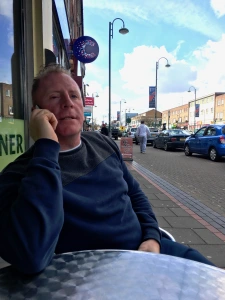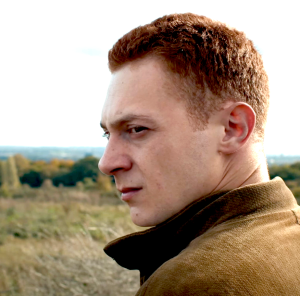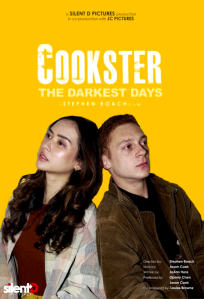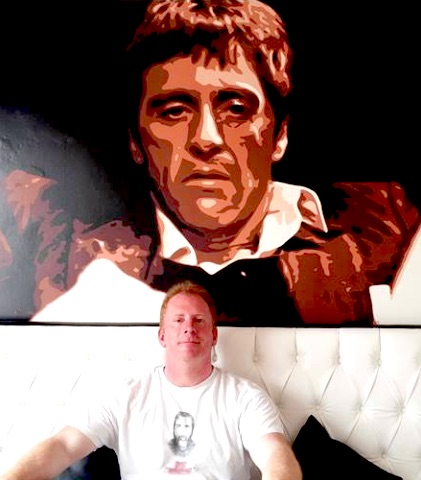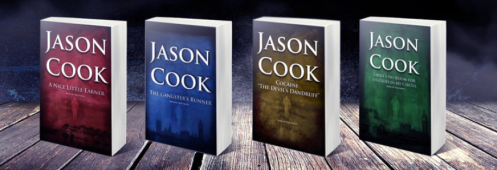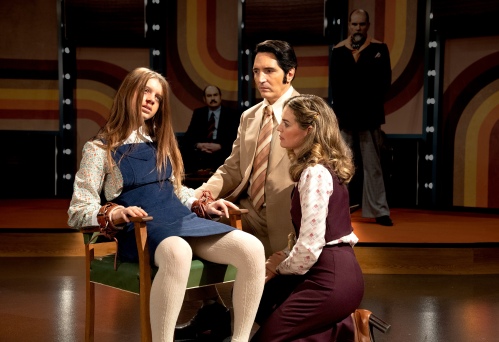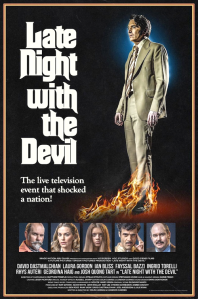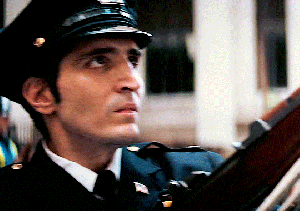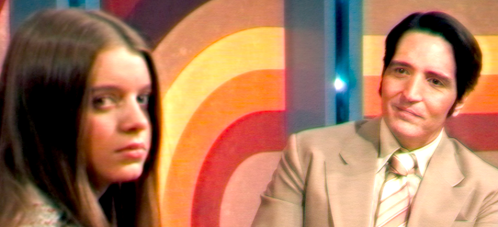Recently, for the third year, I sat through (most of) the annual London Film School graduates’ short film screenings.
This year, I saw the best film I have seen in those three years – Bye Bye Baby. It was a joy.

Jessie (left) and Maria in London’s Soho…
So I had a chat with its writer/director – Jessie Barnett – and its co-writer Maria Pawlikowska, who also played the part of Jemima, a pill-popping housewife, in Bye Bye Baby.
Embarrassingly, one of the few films I missed at the screenings was the one Maria had directed – So Far So Good.
I have since seen it.
I was equally impressed.

An appeal for a “coming-of-age bloodbath” on Kickstarter
JOHN: Jessie, I stumbled online on a wonderfully enjoyable Kickstarter appeal for Everyone Wants to Kill Me which was going to be your graduation film. It was billed as “A coming-of-age bloodbath”.
JESSIE: Yes, we changed the idea.
MARIA: Everyone Wants to Kill Me was before my time, but we started working on that script together. Then we gave up because it was such a big number and there were about a hundred extras for this idea.
JESSIE: It became Strawberry Fields after that.
MARIA: …a virgin sacrifice movie.
JOHN: So Bye Bye Love started as a slasher movie, then became a virgin sacrifice movie and then ended as… How do I describe Bye Bye Baby without giving away what happens towards the end? “The heroine goes a bit looney and there’s blood involved”?
JESSIE: She has a quarter-life crisis, I would call it.
JOHN: At the beginning of the film, there is a caption saying it is based on…
JESSIE & MARIA (TOGETHER): …real insecurities.
JESSIE: I’m from North London. The North London bubble. It’s a very high-pressure community. Competitive. Get married young.
MARIA: Keep up with the Joneses.

Bye Bye Baby – billed as “A Killer Party”…
JESSIE: Yes. Keeping up. And I was going through this phase during Covid where I was single and depressed and unemployed and a lot of my best friends were getting married. I was only 24 and they were 24 too and I’d have to constantly go to these stupid ‘bridal showers’ and ‘baby showers’.
JOHN: What’s a bridal shower?
JESSIE: You don’t know? It’s a global thing. They do it in the UK a lot.
JOHN: I’m very old. We didn’t have them in the 19th Century.
JESSIE: I had to leave one because I had a panic attack and I had to go to Maria’s flat and I told her: “I don’t know why I’m reacting like this. It is so ridiculous. But I’m reacting so badly to all of this and I feel so angry.”
JOHN: Ah! I can see the Bye Bye Baby link.
JESSIE: I had been brought up a certain way.
JOHN: What way?
JESSIE: Once you get to 25, then you marry, have a family. I didn’t want that. I had a panic because I felt all my friends didn’t understand me. My friends from the world I had grown up in. I felt they didn’t take me seriously. They are all amazing people and I love them now. But it was just one of those moments: They don’t care what I care about. And it looks like I’m doing something wrong because I don’t want to co-operate. That’s what I felt.
JOHN: Why were they not treating you seriously? Because you were in the Arts and they weren’t?
JESSIE: It was all in my head. You just feel like you’re behind. They’re all getting married and doing all the things we’ve been told are the right way to live your life… I felt a bit lost.
MARIA: That’s how I felt too.
JOHN: But your family is already arty-farty so they must understand you.
MARIA: Well, my dad is a film director, but he is embarrassed about it. Mortified that he’s not a doctor or that I’m not a doctor. It seemed like every day I was told: “How nice it would be if you ended up being a doctor…”
I was supposed to be a doctor.
JESSIE: I guess we wrote the original script sort-of as a joke to let off steam then thought: No! There’s something in this!
JOHN: There’s humour in the film. You have the same sense of humour?
JESSIE: Yes.
JOHN: Dark humour?
MARIA: Yes.
JOHN: Maria, your own film So Far So Good is a gangstery thing, so it’s necessarily dark.
MARIA: Very dark. It’s funny, but it’s not a comedy. There are some moments.
JOHN: And, Jessie, you’re doing comedy and violence too.
JESSIE: Yes, definitely. I want to definitely focus on that. Definitely, moving forward. Especially comedy.
JOHN: Would you do a comedy-comedy movie?
JESSIE: Maybe. But usually comedy with something else.
JOHN: Are you interested in doing comedy with horror and violence? Or horror and violence with comedy?
JESSIE: Both.
MARIA: Obviously both.
JOHN: And you are interested in…?
MARIA: I’m interested in… I think my stuff is less funny than Jessie’s. I’ve done three and none of them are (pure) comedy.
JESSIE: And a very different type of comedy, I’d say. More nuanced. It’s not in-your-face.
MARIA: Very different from Bye Bye Baby, which was just pushing as far as it would go.
JOHN: Pushing in which way?
JESSIE & MARIA (TOGETHER): To the extreme.

“…with Bye Bye Baby, we did get away with a lot…”
MARIA: Just because you have a good joke doesn’t mean it should go in. Often, joke-joke-joke-joke doesn’t actually amount to a good film. In my stuff, there’s always something else going on, so you have to be very careful with the jokes. Whereas, with Bye Bye Baby, we did get away with a lot.
JESSIE: Yes! Though we did cut a lot of jokes… and we cut out a lot of horror.

“There was much more horror involved…”
There was much more horror involved.
There was this whole scene with the girl who gets her head smashed with a bottle… She wakes up and then there’s this last fight and Rosie finds the e-cigarette and stabs her in the throat with it… Blood everywhere…
And then the woman who owns the home comes back; that was going to be another murder. There was a quick strangle; a quick break-neck.
JOHN: Neither of your films are pure comedy. What’s the quotable synopsis of So Far So Good?
MARIA: It’s about a Bulgarian girl who is hired to honeytrap a juror during a trial and she starts to fall for him and is unsure of what to do. I love film noir and I love femmes fatales and always wanted to do a story from the perspective of a femme fatale.
There’s a lot of absurdity and humour that comes from this clash of worlds. This very English, sweet software developer who is honeytrapped by this exotic bird.
JOHN: You both always wanted to go into the film industry?
MARIA: Well, I didn’t want to go into the film industry. I was a theatre nut. I was the same as Jessie; a musical theatre freak. I just wanted to go to Jacques Lecoq in Paris and I wanted to sing. I had my band.
JOHN (TO JESSIE): You were a musical theatre freak?
JESSIE: Very much so. I actually went to the Sylvia Young Theatre School. I wanted to be ‘in the West End’ as a performer but, y’know…
JOHN: Family background in showbiz?
JESSIE: No. I guess my uncle was once an actor.
JOHN: You guess?
JESSIE: He was, but it didn’t go anywhere. He almost made it in New York and then it just got too much, the acting industry.
JOHN: The people?
JESSIE: The people. The environment.
JOHN: Why did you both go to a film school, not just try to get jobs straight into the industry and work your way up?
MARIA: I was already working in the film industry before. I did English Literature at university and then I was working in film for a couple of years as the development executive for a producer. Then I made my first short A Little Death.
I was born into it. My dad is a film maker: a writer-director. So I tried NOT to make films.
JOHN: Your university was…?
MARIA: Cambridge.
JOHN: You said that with a tinge of embarrassment.
MARIA: Because it’s very embarrassing. I did English and did all the theatre stuff and I was really into it and film happened kind of by accident.
JOHN: You didn’t go into Theatre because…?
MARIA: The thing that I found really difficult about theatre, especially here, is that you really seem to have to have ‘permission’ to do stuff. You can’t just walk into a room and put-on a play. With a film, you can literally just go out and make a film.
JOHN: Can you?
MARIA: If you shoot it on an iPhone.
JOHN: With theatre, surely you can just rent an upstairs room in a pub and put on a play?
MARIA: I suppose. But I think theatre is very cliquey. You need to be in the ‘in crowd’. I just felt alienated from that whole world. At university, obviously, there were a lot of cliques and, let’s say, children of big names. It all felt like a mini-real-world.
JOHN: Were you in The Footlights at Cambridge?
MARIA: I was a Footlights princess.
JOHN: Yer wot?
MARIA: There’s a Footlights panto every year. People take it very seriously. I remember causing a bit of a stir: Who the fuck gave THIS girl a lead roll?
JOHN: Which panto?
MARIA: The Princess and The Pea. I was the princess.
JOHN: Who was the pea?
MARIA: It was just a pea.

Cambridge Footlights’ production of The Princess and The Pea
JOHN: So you had a family background in film and, after university, you were IN the film industry… So why the hell did you decide you had to go to a film school?
MARIA: You really have to LEARN how to make films.
JESSIE: And I felt I needed to learn a lot too. I’d worked on adverts and event videos before film school. I was working as a video editor and just decided I really wanted to make films and I thought: Now’s the time to do it while I’m still young.
MARIA: I’d done costume and running and production assisting and whatnot.
JESSIE: And I felt I needed to learn a lot.
JOHN: Now that’s in the past. You, Jessie, have started Jessie B Films… Is that both of you?
JESSIE: Currently yes.
MARIA: We want to start a company that’s just the two of us, but we need to come up with a name ASAP.
JOHN: ASAP Films. There you are. 10%. Are you actively working on scripts together again?
MARIA: I’ve got this film that I’m obsessed with. There are funny elements, but it’s not a comedy. It’s a horror romance set in Mexico.
JOHN: You should get finance for that. They love a bit of blood in Mexico.
MARIA: Jessie has also come up with this idea for a very morbid rock musical. We are constantly concocting.
JESSIE: Always, always.
MARIA: She needs to write songs. She’s a real songwriter. She wrote all the songs in Bye Bye Baby (except the title song).
JESSIE: They were meant to be trashy pop songs. Not the score.
MARIA: No. The pop songs that play diegetically in the scenes.
JOHN: Die-a-wot? I should have gone to film school. I feel emasculated.
Jessie Barnett’s current director’s showreel is on Vimeo:
PLEASE SHARE THIS BLOG VIA:
